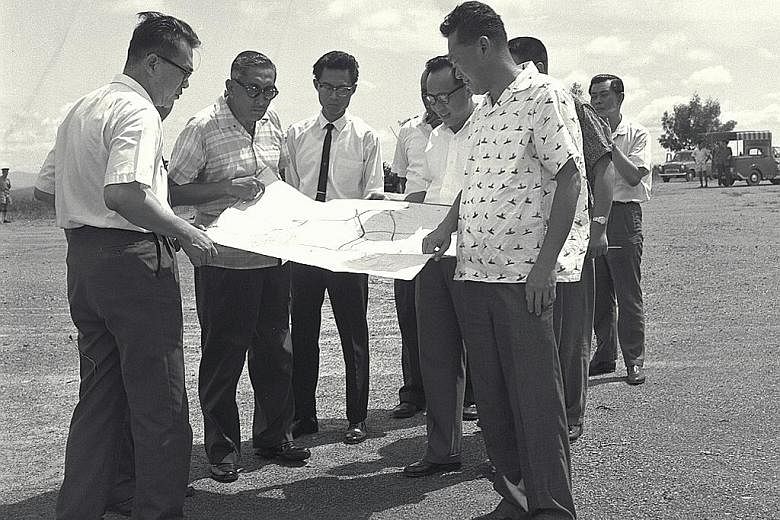Back in 2008, I worked on a book on the Singapore civil service. Commissioned by the Public Service Division, it traced the development of the public service over the decades.
I enjoyed the research for the book, especially the interviews with civil servants past and present, and came away with a deep respect for the people and the work they did.
I chose the title of the book deliberately: Pioneers Once More: The Singapore Public Service 1959-2009.
Back then, not many people talked about pioneers. But it was quite clear to me, after interviewing folks like Mr Peter Ho, Ms Yong Ying-I and Mr Ravi Menon, that these senior civil servants knew exactly what the civil service needed for the future: be innovative, embrace change, not defend the status quo; take risks, not just obey rules.
As the first generation did in the 1960s, today's civil servants had to become Pioneers Once More.
My thoughts went to that book yesterday, as several MPs spoke about the role of the civil service on Day 2 of debate on the President's Address.

Mr Chee Hong Tat (Bishan-Toa Payoh GRC), Minister of State for Communications and Information and Health , disagreed with those who bemoaned the lack of innovation in Singapore.
He cited examples of policy innovation over the years: building the Jurong industrial township, then Jurong Island; developing NeWater; making the energy market contestable; and starting Northlight and Pathlight schools for less academically-inclined children. Mr Chee was involved in the last two as a civil servant.
But he also warned: "My worry is that we get trapped in the comfort zones of our current success, and we start to lose our appetite to take risks and question the status quo."
To get to the next level, "we need to embrace the enterprising spirit of our pioneers and we need to innovate", he said.
Mr Seah Kian Peng (Marine Parade GRC), also spoke up for civil servants, saying: "The government is the servant of the people, but civil servants are not minions to be ordered about; they are our brothers, our sisters and they are also our friends too. They are the people who help those of us who cannot help ourselves."
A different aspect was raised by Workers' Party Non-Constituency MP Leon Perera, who said: "I respect our civil service and the civil servants who have devoted their careers to serving the needs of the people. But to have a core leadership that has very few with any other kind of career profile, that opens up the danger of groupthink, self-rationalisation and self-congratulation."
Mr Perera was with the Economic Development Board before leaving to start his consulting agency.
He went on: "When too much power becomes entrenched in one party or group of persons or individuals, whoever they may be, from whatever party they may come from, inevitably, that power breeds complacency and the tendency to be self-serving. It is a matter of time."
Mr Perera's warning bears thinking about. The ruling People's Action Party has been renewing its top leadership rungs with more of the same, often from the military and civil service. This model of bureaucrat-minister has served Singapore well and many voters are comfortable with it.
But having leaders cut from the same cloth can inhibit Singapore from breaking through to the next level. We all know the challenges the nation faces: a more uncertain global environment without; a more educated, demanding, footloose younger generation within. Businesses trapped in a high-cost, low-productivity bind even as the screws tighten on cheap foreign labour. Middle-aged workers struggling to keep or find good jobs; and one of the fastest ageing populations in the world.
The way forward is not so clear.
Some think the answer is economic and social: grow the economy and share the pie, and remain cohesive.
Many others believe change also has to be political. There is a constant call for more diversity of views and leadership.
The first generation of ministers and civil servants could be pioneers because they had no choice and, hence, no baggage. There was no Temasek Holdings, no GIC, no government-linked company, no major agency with interests to be protected.
Today's ministers and civil servants start from a very high base, with huge surpluses, and a pantheon of established, successful institutions.
But a successful legacy can be an albatross that weighs successors down. Only the very determined and very brave from these ranks will dare change what worked, or pioneer new methods.
Or those from the outside - those with no policy to defend, no mentor to placate, no vested interest to tiptoe around.
It takes years to refresh leadership rungs. It will be the nation's loss if the PAP doesn't do better to broaden its talent pool beyond the public sector.
In the interim, to avoid the risk of self-congratulation and groupthink, the government can pay more heed to views from people outside the establishment.


